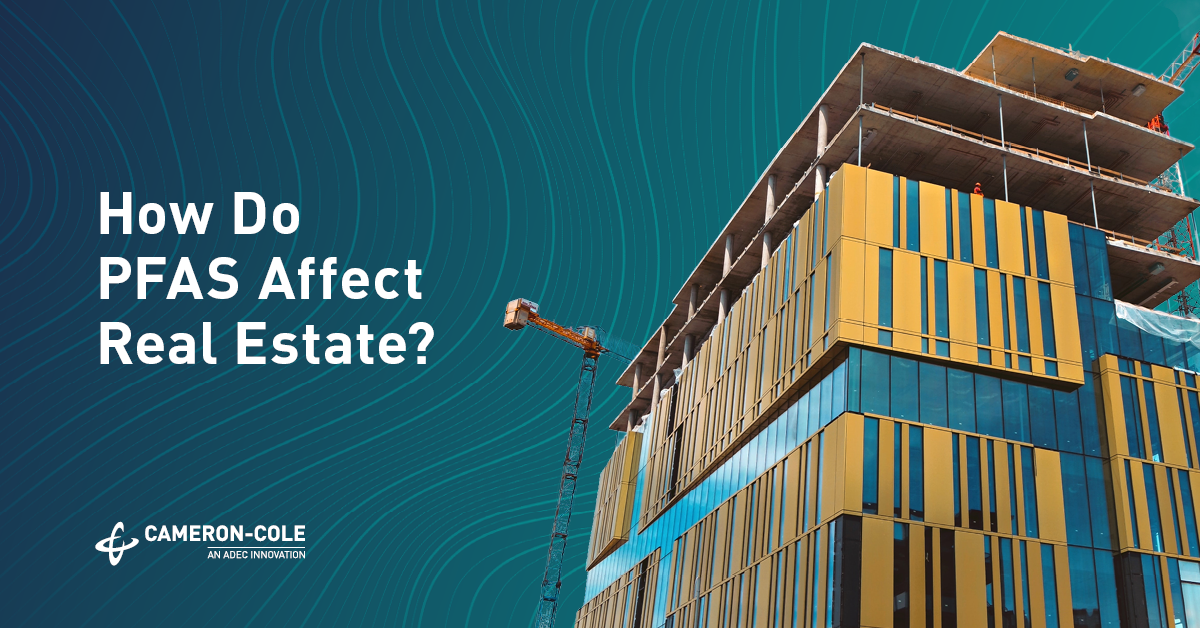How Do PFAS Affect Real Estate?
Article
Now known as “forever chemicals,” these substances are notoriously slow to break down and have been detected in all media: soil, groundwater, surface water, wastewater, sediments, and in the air.
Little was known of the health effects surrounding per-and polyfluoroalkyl substances (PFAS) in the 1940s when these man-made chemicals began to be widely used in the production of household products and materials. Now known as “forever chemicals,” these substances are notoriously slow to break down and have been detected in all media: soil, groundwater, surface water, wastewater, sediments, and in the air.
The Environmental Protection Agency (EPA) has proposed designating PFAS as hazardous substances under the Comprehensive Environmental Response Compensation and Liability Act (CERCLA). While a federal ruling is not expected until mid to late 2023, many industries, including real estate, are preparing for regulations and potential litigation ahead of time.
Researchers are increasingly acknowledging the detrimental effects of PFAS in the environment. As these chemicals are known not to decay, future potential liability may exist within the real estate industry, and proactive measures should be taken to minimize litigation burdens or risks.
While current litigation primarily surrounds drinking water supplies, upcoming regulations are expected to shift to secondary locations where these contaminants may have flowed via sediment transport or shallow groundwater migration. Addressing potential risk of exposure and detrimental effects on human health could require management, mitigations, or even cleanups. This may be especially true if the EPA’s proposal to designate PFAS as a hazardous substance becomes law, increasing potential remedial action costs and litigation recovery actions.
How Properties May be Affected by PFAS
The connection between real estate and PFAS contamination can be preliminarily evaluated through a SNAP analysis, short for Source, Non-Source, Adjacent, and Proximate. In such an analysis, source sites are those where contamination is present and emanating to the environment, while non-source sites are those onto which contamination has migrated. An adjacent site shares a property line with a source site but is not itself contaminated, and a proximate site is near the source site without sharing a property line (or contamination).
To better evaluate and mitigate potential PFAS risks in real estate transactions, asset acquisition teams can take various steps, including environmental prescreening the target real estate acquisition using a proprietary desktop solution such as RiskFacts and working with an environmental consultant to add a PFAS SNAP analysis to their Phase I Environmental Site Assessment (ESA) Report investigation. These actions allow for possible identification of emerging contaminant impacts, like PFAS, as “non-scope considerations.” Environmental due diligence helps to uncover future potential liabilities and may lead to a more in-depth evaluation to determine potential risks and mitigation costs that could impact the transaction.
During a real estate transaction, developers, banks, and other financial entities should consider evaluating the potential liability of a property being source point of PFAS to the environment where historical PFAS manufacturing, use, and/or storage are suspected. While current regulations may not necessitate mitigation efforts in some states, it is important that any findings be documented to help identify potentially responsible parties that could be liable for future regulatory investigations and/or remediation costs. Contractual environmental risk allocations – including indemnities, releases, or escrow agreements – should also be considered for properties with potential PFAS contamination.
High-Risk Property Remediation
Some properties may be more at risk for potential PFAS contamination, including source properties like those near airports, near wastewater treatment facilities, firefighting training grounds, and manufacturing facilities, where PFAS-containing materials may have been used and also produced; passed through as a waste stream; and/or stored. In advance of acquiring or selling these properties, a PFAS evaluation must be a key component of the environmental due diligence process.
Additionally, consider retaining environmental experts about potential impacts to the property from developing and evolving PFAS regulations. As state and federal laws constantly evolve, a third-party consultant can provide valuable insight regarding existing and anticipated regulations, particularly geared toward soils, sediments, and groundwater – which can have a direct impact on the real estate market value.
If named as hazardous substances, properties with PFAS contamination may benefit in the future from brownfield and voluntary tax credit cleanup programs, which often allow liability protections for pre-existing environmental conditions. Discuss these programs and any property-specific concerns with an environmental consultant to ensure you are minimizing any PFAS risks associated with your property.
It is also worth noting that while a particular piece of real estate may have been remediated and cleared of other compounds, new PFAS regulations may require additional investigation and remedial efforts under the CERCLA reopener clause. A qualified expert can take the research burden of these risks off you and your real estate acquisition team.
Assessing the Impact of PFAS on Real Estate Valuations
As PFAS awareness grows, contamination effects are being discovered across all types of land uses including commercial, residential, and municipal. Real estate professionals use various methods to determine existing impact of PFAS contamination on property value or neighborhood including paired sales, case studies, multiple regression and income/yield adjustments. Additionally, an appraiser can consider sale/resale, simple regression, market surveys, and other methods.
Environmental class action cases resulting from PFAS contamination may benefit from regression analysis. This method has been frequently used in estimating residential property values and environmental impacts on such properties. In these instances, the appraiser accepts the utilization of mass appraisal assignments and measure the effects, if any, of PFAS or other contaminants on property values.
Other techniques to determine mass real estate impacts from contamination include a sale/resale analysis, comparing the sale of a property without a detrimental condition to the sale of a property or group of properties with a detrimental condition. When using a sale/resale analysis to measure risk, public knowledge of the contaminant must be considered.
Importance of Market Awareness
Emerging contaminants like PFAS require a keen sense of market awareness. As PFAS regulations continue to develop, limited current regulatory standards and evolving guidance may cause a lag in market awareness. As states establish new regulatory conditions, prior property transactions may not reflect new uncertainties or risks because the property may have not been considered “contaminated” under prior guidelines. However, if evidence of property contamination becomes available, then its potential liabilities on a transaction or resale value need to be evaluated moving forward.
In instances where market awareness is lacking, a case study approach under similar or equivalent regional or local market conditions can be advantageous. In a certain subject area, market participants may be unaware or misinformed about the potential labilities of PFAS contamination. In these instances, such a case study approach allows an appraiser to study a similar situation with informed market data and use those findings to guide opinions on this subject.
Real estate is always a nuanced market, and the introduction of emerging PFAS contamination at the potential asset evaluation and transactional level can add additional challenges. Consulting with a third-party environmental expert can help avoid costly clean-up and lessen litigation effects on real estate transactions now and in the future.
Cameron-Cole, an ADEC Innovations company, specializes in assisting our clients with complex environmental liabilities. We have performed thousands of due diligence Phase I and Phase II Environmental Site Assessments (ESAs) for real estate investors, law firms, and other clients. We provide technical support to clients addressing regulatory response and litigating against the manufacturers of PFAS. Contact us for a free consultation or learn more about PFAS.









